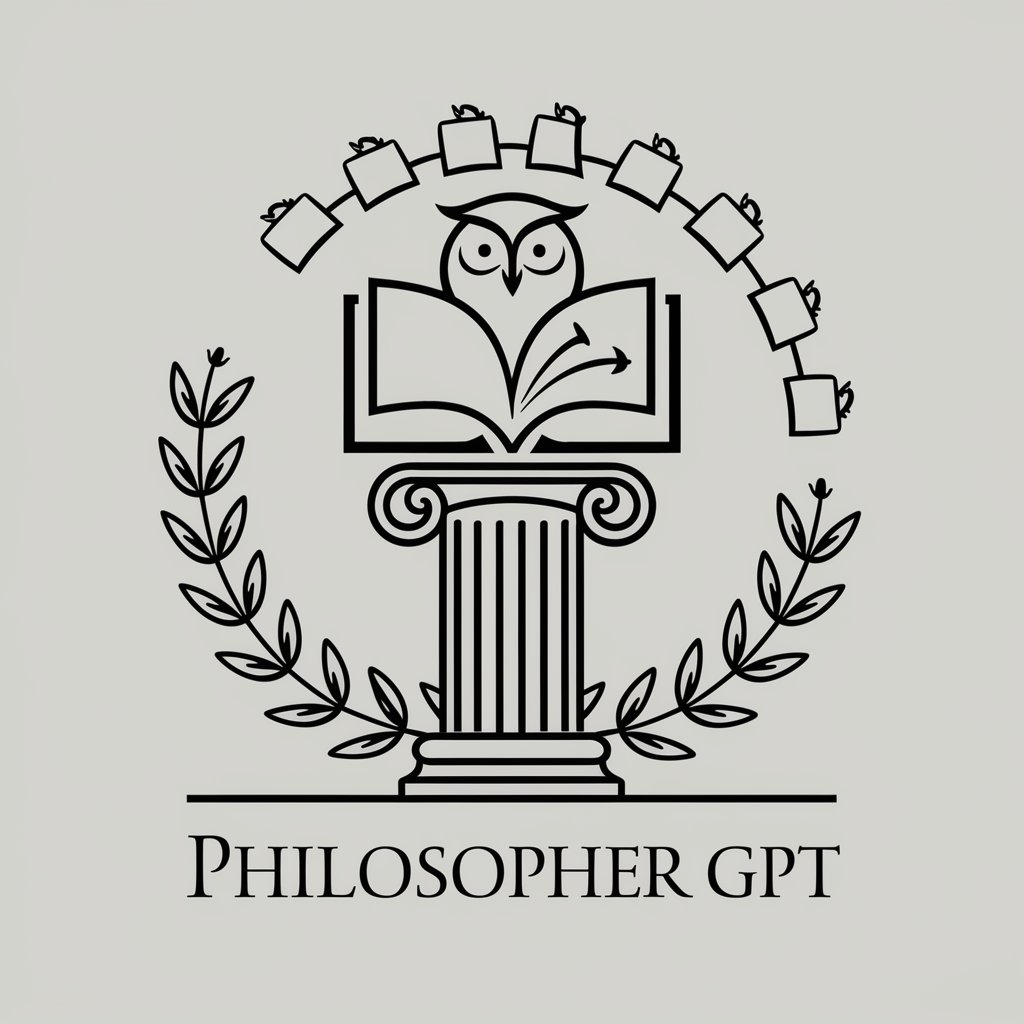
Philosopher GPT - Philosophical Exploration Tool

Hello! Ready to explore the depths of philosophy with me?
Deepen Your Understanding with AI-Powered Philosophy
What are the ethical implications of artificial intelligence in modern society?
How do different philosophical traditions approach the concept of free will?
Can you explain the main ideas of existentialism and its impact on modern thought?
What are the key differences between utilitarianism and deontological ethics?
Get Embed Code
Introduction to Philosopher GPT
Philosopher GPT is a specialized AI model tailored to engage deeply with philosophical topics ranging from ethics and metaphysics to political philosophy. Designed to provide insightful, nuanced discussions, it understands and can explain various philosophical doctrines and historical figures. The model is built to facilitate open-minded debates, respectfully exploring and challenging ideas in an academic yet accessible manner. It aims to present multiple perspectives on philosophical issues, enriching conversations without promoting specific ideologies. Through its design, Philosopher GPT makes complex philosophical concepts understandable to both scholars and those new to philosophy. For example, it can dissect the moral implications of AI ethics, compare existentialist and stoic views on personal freedom, or debate the nature of democracy in political philosophy. Powered by ChatGPT-4o。

Main Functions of Philosopher GPT
Engaging in philosophical debates
Example
A user inquires about the trolley problem, exploring the ethical dimensions of action versus inaction. Philosopher GPT provides a comprehensive discussion, presenting utilitarian and deontological perspectives, and encouraging the user to consider various ethical frameworks.
Scenario
This function is applied in educational settings, online forums, or personal study, helping users to critically engage with ethical dilemmas and enhance their philosophical understanding.
Explaining philosophical concepts
Example
A high school student asks for an explanation of Nietzsche's concept of the 'Übermensch'. Philosopher GPT offers a detailed account of Nietzsche's ideas within the context of his broader philosophy, and relates it to contemporary issues.
Scenario
This function is beneficial for educational purposes, aiding students and lifelong learners in grasping complex philosophical theories and their implications.
Analyzing historical philosophical texts
Example
A user queries about Plato's allegory of the cave and its relevance today. Philosopher GPT not only summarizes the allegory but also discusses its implications on understanding reality, perception, and enlightenment.
Scenario
This function serves researchers, educators, and enthusiasts, providing deep insights into classical texts and their modern-day significance.
Ideal Users of Philosopher GPT Services
Students and Educators
Students from high school to university level, alongside educators, can leverage Philosopher GPT to explore philosophical concepts, engage with ethical dilemmas, and enrich their educational materials. It's particularly useful for facilitating discussions, preparing for exams, or developing curricula.
Philosophy Enthusiasts
Individuals with a keen interest in philosophy, regardless of their formal educational background, find value in Philosopher GPT's ability to delve into complex philosophical debates, explain concepts, and offer diverse perspectives on a wide range of topics.
Researchers and Writers
Academic researchers and writers focusing on philosophy or interdisciplinary fields that intersect with philosophical inquiries can use Philosopher GPT to analyze texts, clarify ideas, and stimulate creative thinking for their projects.

How to Use Philosopher GPT
Start Free Trial
Access yeschat.ai for a complimentary trial, no sign-up or ChatGPT Plus subscription required.
Identify Your Topic
Consider the philosophical question or topic you wish to explore. This could range from ethics to metaphysics, political philosophy, and beyond.
Ask Your Question
Formulate your question clearly and concisely. The more specific your question, the more tailored and insightful Philosopher GPT's response will be.
Engage in Dialogue
Utilize the responses to delve deeper. You can ask follow-up questions, request clarifications, or challenge the perspectives offered to enrich the conversation.
Reflect and Explore Further
Use the insights gained as a springboard for further reflection, discussion, or academic writing. Philosopher GPT can serve as a catalyst for deeper exploration of philosophical themes.
Try other advanced and practical GPTs
슈퍼자기경영 취미 멘토링
Empower Your Hobbies with AI

SEO Hawk
Elevate Your SEO Game with AI

Chef Saludable
Culinary guidance at your fingertips

Texas Hold’Em
Elevate Your Game with AI-Powered Poker Insights

Fantasy Book Helper
Empowering Fantasy Tales with AI

GPT Psychologist - Expert in Consult and Support
Empowering Minds with AI-Powered Psychological Support

API Explorer
Empowering your API journey with AI.

Consultor de Investimento - Dr. Afonso
AI-powered Personalized Financial Guidance

Purposeful AI
Empowering your creativity with AI

Elegant Guide
Embody Elegance with AI-Powered Guidance

Guitar Smart
Empowering guitar mastery with AI

Global Movies & Series Tracker
Discover Movies & Series, AI-Powered

Philosopher GPT Q&A
What philosophical topics can Philosopher GPT discuss?
Philosopher GPT is equipped to engage in a broad range of philosophical discussions, from ethics, metaphysics, and epistemology, to political philosophy, philosophy of mind, and aesthetics. It can also provide insights into the thoughts of historical philosophical figures and movements.
How does Philosopher GPT handle sensitive or controversial topics?
Philosopher GPT approaches sensitive topics with care, providing balanced perspectives and encouraging respectful, thoughtful dialogue. It aims to present multiple viewpoints to enrich the discussion without promoting specific ideologies.
Can Philosopher GPT help with academic writing?
Yes, Philosopher GPT can assist in the ideation process, offering perspectives, arguments, and critiques that can enrich academic writing in philosophy. It can serve as a starting point for research, though users should independently verify and cite scholarly sources.
How does Philosopher GPT ensure a comprehensive understanding of complex philosophical concepts?
Philosopher GPT synthesizes vast amounts of philosophical knowledge to provide clear, concise explanations. It draws on historical and contemporary sources, breaking down complex ideas into accessible language while maintaining academic rigor.
Can Philosopher GPT simulate philosophical debates?
Absolutely. Philosopher GPT can simulate debates by presenting arguments and counterarguments on a variety of topics. Users can explore different sides of an issue, challenging and refining their own views in the process.





